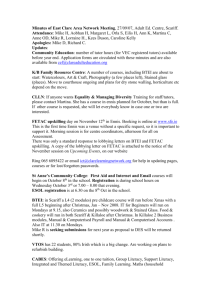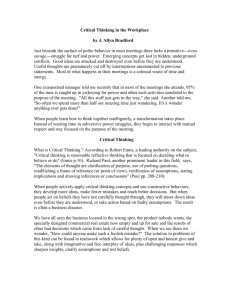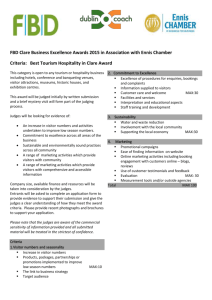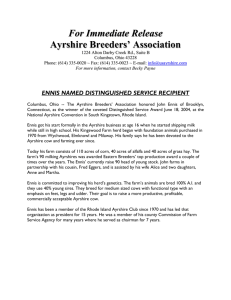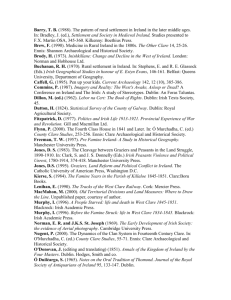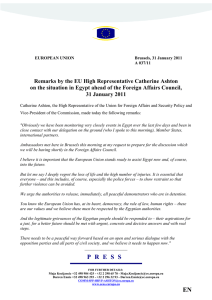Land league etc 1953.doc
advertisement
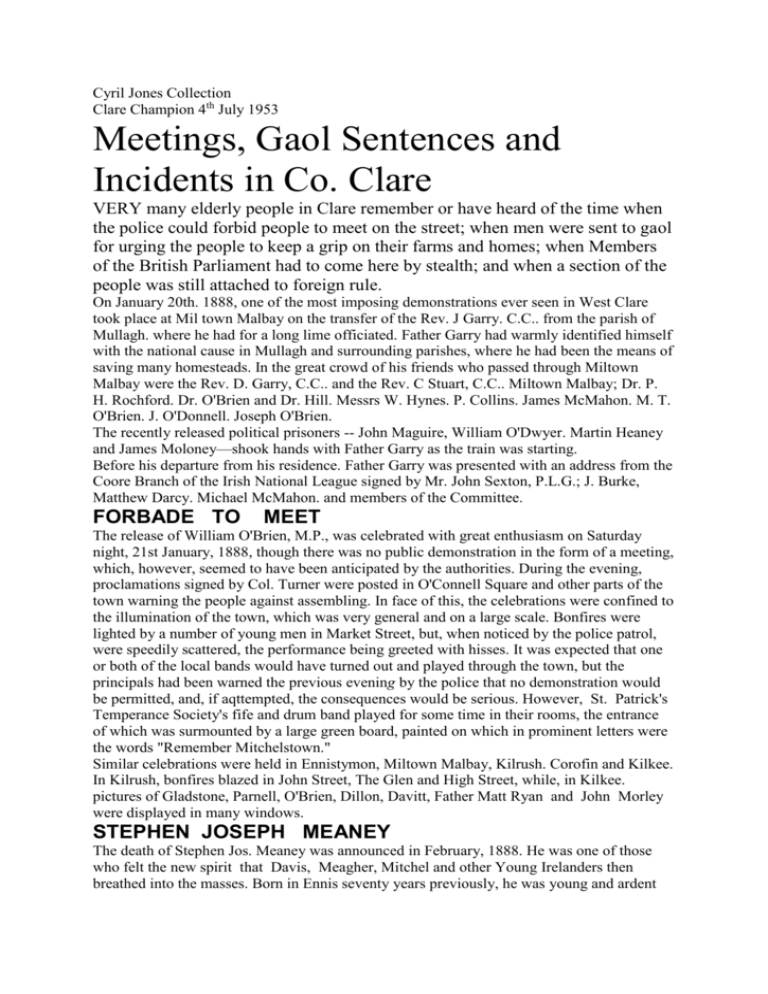
Cyril Jones Collection Clare Champion 4th July 1953 Meetings, Gaol Sentences and Incidents in Co. Clare VERY many elderly people in Clare remember or have heard of the time when the police could forbid people to meet on the street; when men were sent to gaol for urging the people to keep a grip on their farms and homes; when Members of the British Parliament had to come here by stealth; and when a section of the people was still attached to foreign rule. On January 20th. 1888, one of the most imposing demonstrations ever seen in West Clare took place at Mil town Malbay on the transfer of the Rev. J Garry. C.C.. from the parish of Mullagh. where he had for a long lime officiated. Father Garry had warmly identified himself with the national cause in Mullagh and surrounding parishes, where he had been the means of saving many homesteads. In the great crowd of his friends who passed through Miltown Malbay were the Rev. D. Garry, C.C.. and the Rev. C Stuart, C.C.. Miltown Malbay; Dr. P. H. Rochford. Dr. O'Brien and Dr. Hill. Messrs W. Hynes. P. Collins. James McMahon. M. T. O'Brien. J. O'Donnell. Joseph O'Brien. The recently released political prisoners -- John Maguire, William O'Dwyer. Martin Heaney and James Moloney—shook hands with Father Garry as the train was starting. Before his departure from his residence. Father Garry was presented with an address from the Coore Branch of the Irish National League signed by Mr. John Sexton, P.L.G.; J. Burke, Matthew Darcy. Michael McMahon. and members of the Committee. FORBADE TO MEET The release of William O'Brien, M.P., was celebrated with great enthusiasm on Saturday night, 21st January, 1888, though there was no public demonstration in the form of a meeting, which, however, seemed to have been anticipated by the authorities. During the evening, proclamations signed by Col. Turner were posted in O'Connell Square and other parts of the town warning the people against assembling. In face of this, the celebrations were confined to the illumination of the town, which was very general and on a large scale. Bonfires were lighted by a number of young men in Market Street, but, when noticed by the police patrol, were speedily scattered, the performance being greeted with hisses. It was expected that one or both of the local bands would have turned out and played through the town, but the principals had been warned the previous evening by the police that no demonstration would be permitted, and, if aqttempted, the consequences would be serious. However, St. Patrick's Temperance Society's fife and drum band played for some time in their rooms, the entrance of which was surmounted by a large green board, painted on which in prominent letters were the words "Remember Mitchelstown." Similar celebrations were held in Ennistymon, Miltown Malbay, Kilrush. Corofin and Kilkee. In Kilrush, bonfires blazed in John Street, The Glen and High Street, while, in Kilkee. pictures of Gladstone, Parnell, O'Brien, Dillon, Davitt, Father Matt Ryan and John Morley were displayed in many windows. STEPHEN JOSEPH MEANEY The death of Stephen Jos. Meaney was announced in February, 1888. He was one of those who felt the new spirit that Davis, Meagher, Mitchel and other Young Irelanders then breathed into the masses. Born in Ennis seventy years previously, he was young and ardent when the fiery exhortations of the men of '48 stirred the country. His share in the rising of that year led to a term of imprisonment in Carrickfergus Castle. He was released when, in the opinion of the Government, the storm had blown over. Young Meaney had chosen journalism as a career. For a time he was connected with the Clare Journal and afterwards with a Limerick paper. He subsequently became editor of the Drogheda Argus, and was connected with the Dublin and Belfast Press in various capacities. In Liverpool he as associated with the staff of the Daily Post and afterwards went to America, where he became a vigorous supporter of the Fenian policy and was one of the Senators in John O'Mahony's organisation. Towards the end of 1866 he came back and early in 1867 was arrested in London, whence he was removed in custody to Dublin for trial. His trial raised some novel points of law, amongst others his liability for words spoken in America, for acts done by others in the British Domions whilst he was in America, and for acts deposed to by an informer without corroboration. He was sentenced to fifteen years penal servitude. After his release, Meaney went to America where he resumed his association with journalism. A cablegram was received in Ennis by Mrs. Mary Meaney, his mother, from Cornelius Moloney, stating . before dying, her son expressed a wish that his remains should be laid in the family burial ground in New Hall, Ennis. A reply was accordingly sent requesting the remains to be sent on. M.P. SENT TO GAOL Mr. Joseph R. Cox, MP. for East Clare, was arrested in London on Monday, 23rd January, 1888, by detectives from Scotland Yard and on the following Thursday was taken to Ennis. On arrival at the station in Ennis, where there was a large force of police and military on duty, Mr. Cox was placed in a covered car and, with a police escort of transport cars, was driven past Clonroad fair green to the Courthouse to avoid any demonstration in the town. He was followed by Mr. Abraham, M.P., Limerick; Mr. Edw. Finucane, Mr, E. J. O'Meehan, solr.; Mr. James Lynch, Mr. P. Cahill, and other friends on cars. Nothing of any consequence occurred until the turn at the Courthouse gate was reached. Here a large crowd had collected at Mrs. Brennan's hotel and they raised cheer after cheer. District Inspector Hill jumped off the car on which he was driving and called upon the police to charge the people. The people, however, avoided any collision and matters went off peaceably. The Courthouse gate was guarded by police and the general public prevented from entering. Amongst the general public at the gates were John P. Keane and Patk. Mclnerney, president and secretary of the Ennis branch of the National League. In the Courthouse were the Rev. Father O'Neill, O.S.F.; Mr. W. Abraham, MP.; Mr. R. Stackpool; J. W. Scott. J.P.: G. D. Mercer, R.M.; Dr. Culligan. J.P. Mr. Cox was taken before Mr. Hodder, R.M.. and formally remanded in custody to the Ennis Bridewell until the following day, when he was defended by Mr. John Redmond, M.R. instructed by Mr. T. Lynch, solicitor. Evidence concerning a speech delivered from the window of Carmody's Hotel by Mr. Cox was given by Constable Neil McLoughlin, a police notetaker stationed in Ennis at the time. After hearing a number of other witnesses, Mr. Hodder said that the magistrates had come to the conclusion that the defendant was guilty, and the fact of his occupying a prominent position made the offence more serious. The sentence would be four months imprisonment with hard labour. Mr. Redmond gave notice of appeal and bail was accepted, but as Mr. Cox was leaving the Courthouse he was arrested on a similar charge in connection with a speech he had made in Kildysart. Bail was refused and he was removed to gaol the same evening. At his trial subsequently he was sentenced to a month's imprisonment. CLARE'S CATTLE POPULATION In 1887, County Clare had 166.717 head of cattle, as against 169.928 in the previous year. FREEMASONS' DANCE The Freemasons of Limerick and district held a ball at the Athenaeum on Friday night, January 27lh. 1888. The ball was given by Sir James Spaight, Provincial Grand Master. The attendance from Clare included Mr. John Hill. D.P.G.M.. Ennis; Mr. and Mrs. Alton. Corbally: Miss Petty. Old Ground Hotel; Miss Rose Rainsford. Sixmilebridge; Mr. and the Misses Bentley. Hurdlestown; Mrs. Moreland. Tomgraney; Miss Moreland. do.; Arthur P. Spelman, Killlaloe; D. E. Shine. Fern Hollow. Killaloe: Capt. A. Pilkington. Ennis; Mr. R. M. Hill. D.I.. Ennis. £12 FOR THREE-YEAR-OLD CATTLE At the January fair in Ennis in 1888, business was opened the previous evening when a large number of buyers attended. There was a brisk demand for good stock. There was an advance of 30/- per head for stores since October. The quotations were: Three-year-old heifers and bullocks, £12 to £14; 2 ½ year-olds, £8 to £10; yearlings, £5 to £7. Mr. Daly of Enniistymon sold half a score of three-year-old heiffers at £13/17/6 each; Mr. T. Kelly, of Dromore, sold half a score of 2 ½ year-old heifers at £11/5/- each; Mr. Pat O'Halloran sold another lot at £11/5/- each; Mr. T. Power sold a half score of three-year-old heifers at £11/12/6 each; Mr. C. J. McMahon sold a lot of 2 ½ -year-old heifers at £10/15/- each; Mr. John Fahy, of Deerpark, sold a lot of 2 ½ -year-old bullocks at £11 each; Mr. J. Moran sold a lot of twoyear-old bullocks at £7/10/- each; and Mr. E. Murphy sold a lot of two-year-old heifers at £10 each. In the sheep department there was a marked improvement, both in regard to sales and prices. Store sheep quoted at from 30/- to 40/-, and fat sheep from 40/- to 50/-, Dr. Foley Brew sold a lot of old ewes at 40/- each, and Mr. J. Cullinan, solicitor, Ennis, sold as the top lot of the fair at 52/- each. Choice bacon pigs only realised 38/- per cwt.; bonhams, 10/- to 12/- each. FOOTBALL IN ENNIS On Sunday, 5th July. 1888, at a meeting of the Ennis Dalcassians Mr. P. Aherne proposed, and Mr. D. O'Looney seconded, that Mr. S. J Dunleavy be elected president for the current half-year. This was agreed to and Mr. Dunleavy returned thanks. Mr. P. Aherne, hon. secretary of the Co. Committee of the G.A.A., was elected vice-president. As captain, Mr. D. O'Looney was proposed by Mr. D. Duggan and seconded by Mr. Syl. Hehir. Mr. J Casey was elected vice-captain. Mr Anthony Garrahy was elected treasurer instead of Mr. Ed. Moloney who had been transferred from Ennis to Gort. Mr. A. McHugh was placed at the head of the committee and the following were also elected members: M. Duggan, P. Howard. P. Mullins, T. O'Donoghue and M Keane. A 'DEMOCRATIC UNION" THEN TOO At the monthly meeting of the Kilrush Town Commissioners on 2nd February, 1888, the Chairman, Mr. John C. Mahony, presiding, the following resolution was adopted on the motion of Mr. John Reidy and seconded by Mr. Michael Lynch:— "That we, the Commissioners of the township of Kilrush in public meeting assembled, in common with the great majority of our countrymen, welcome to our shores Mr. John Morley, M.P., and the Marquis of Ripon, who come on behalf of the English people to hold forth to us the olive branch; we look upon them as the harbingers of that peace, unity and friendship that will cement the great democratic union that has sprung up between the English people and their Irish brethren, and which will tend to erase the foul blot of misrule and coercion from the escutcheon of England and wipe away for ever the cause of Irish discontent.” DALGAIS FOOTBALL CLUB At a meeting of the Dalgais Football Club, Newmarket-on-Fergus, on 11th February, 1888, the Rev. J. Loughnane, Adm., presided. Mr. Jas. Halpin proposed, and it was unanimously adopted, that Father Loughnane be president. Mr. E. M. Bennett and Mr. James Halpin were elected vice-presidents- Mr. Pat McNamara, Junr., Kilnasoolagh, was appointed hon. secretary, and Mr. William P. Reidy, of Shepperton, was appointed treasurer. Mr. Thomas J. O'Neill. Newmarket, was appointed captain, and the following were elected on the committee: T. P. O'Neill, Ballygreen ; Martin Sheehan, Ballycornelly; P. O'Grady, Trenahow; James Aherne. Lislea; John O'Neill, Newmarket; P. Clare. Leminagh; and Martin Murphy. Urlanmore. VACANCY FILLED A vacancy occurred on the Clare County Board G.A.A. in February, 1888. by the resignation of the O'Donnellan Blake Foster, who preferred to act on the Central Committee. His place was filled at a meeting of that body by the election of Mr. Michael Nagle. of Kilfenora two other candidates for the position having withdrawn in favour of Mr. Nagle. POLITICAL PRISONERS At a meeting of the Kilrush Town Commissioners, Mr. J. C. Mahony presiding, resolutions of sympathy with Rev. M. Ryan, the Lord Mayor of Dublin, and Messrs O'Brien. Hooper and Sheehy. MPs., and the other political prisoners, were unanimously adopted. HIGH SHERIFF OF CLARE H. V. D’Esterre. of Rosmanagher, Sixmilebridge. was on Tuesday, 21st February. 1888. sworn in by J. H. Harvey. Clerk of the Crown, as High Sheriff for Clare for that year. Capt. Croker was appointed Sub-sheriff, and Mr. G. Walton, solicitor, as Returning Officer. DENIS MCNAMARA'S RELEASE Mr. Denis McNamara. Jail Street, Ennis, was released from Limerick jail on March 9th, 1888 after serving two months' imprisonment for selling the paper, United Ireland. He was accompanied to the railway station by the Victualler’s Brass Band. The first use he made of his liberty was to serve the following telegram to R. M. Hill, D.T., Ennis; "Never in better health; nor the least afraid of Balfour's coercion or pensioners or briefless barristers, ready for another fight. United Ireland for ever. God save Ireland—McNamara." A further charge against him for selling "United Ireland" was called the same day at Ennis Petty Sessions but was adjourned owing to the absence of the defendant and the principal witness, a boy named Dunne, who had evaded the police for over a year and a half. Young Dunne, who had lived in the Turnpike with his mother was sent to McNamara's by some members of the Foresters Club for the usual weekly copy of United Ireland. The Foresters had their Club in rooms in Dunne's house. The police watched the boy going into McNamara, and when he came out, they searched him and found the copy of United Ireland under his coat. They summoned him as a witness, but Dunne left for the country and spent a time in the house of Mr. Peter McInerney, Lisheen. Later, the case against McNamarra was eventually withdrawn. WHERE THE O'GORMAN MAHON LIVED The Retreat, Lisdeen, the residence of Francis Coffey, C.E., was burned on Tuesday, March 12th, 1888. This cottage was the place in which O'Gorman Mahon, M.P., spent his boyhood. Many were of the opinion that the legislator was born there, but others say that he first saw the light of day in Mill Street, Ennis. For about forty years The Retreat was the residence of Mr. Coffey, C.E., whose younger son, Mr. James Coffey, was in Kilrush while the fire was spreading. Valuable books and papers were rescued, but a big quantity of furniture was destroyed.

